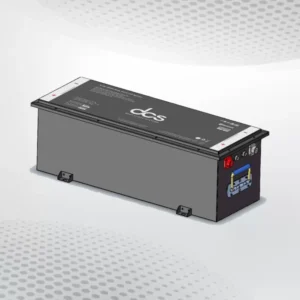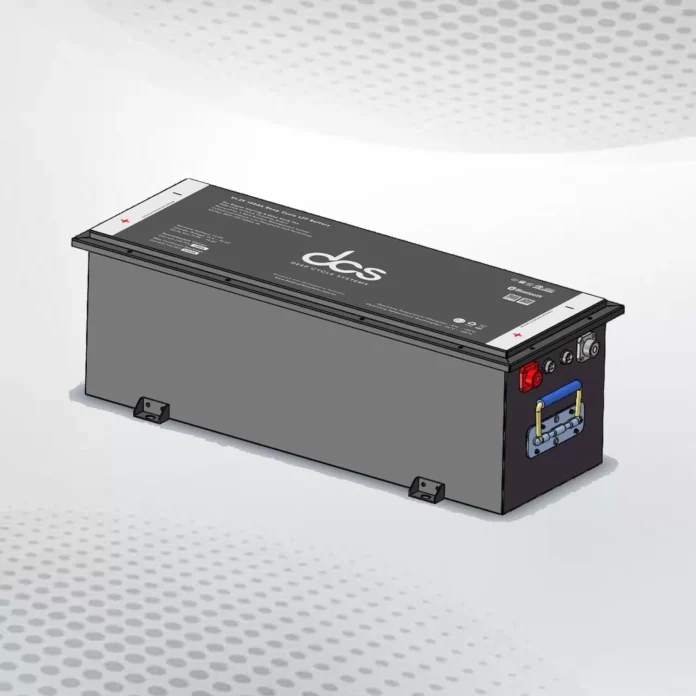The demand for efficient and reliable power sources continues to grow in today’s fast-paced world. One technology that has been gaining significant attention is the use of 48v batteries. These batteries are versatile and can be used in a variety of applications, from electric vehicles to renewable energy systems. In the broader context of energy transition, the role of 48v-batteries in renewable energy systems is indispensable. They facilitate a smoother integration of green energy into our daily lives, empowering a sustainable approach to meeting our growing energy needs without compromising environmental values.
Enhanced Energy Efficiency and Performance
48v-batteries stand out in the energy storage landscape for their superior energy efficiency and robust performance capabilities. Unlike their lead-acid counterparts, these advanced batteries can store a greater amount of energy more efficiently, thereby enabling devices and systems to operate longer between charges. This efficiency translates into improved operational performance for a variety of applications.
For instance, in the realm of electric vehicles, this means achieving longer driving ranges without the need for frequent stops to recharge. In the context of renewable energy installations, it allows for a more reliable power supply, even without consistent sunlight or wind. The secret behind the success of 48v-batteries lies in their sophisticated technology, which ensures that energy is not only stored in a more compact form but also delivered more smoothly to where it’s needed.
This smooth delivery is crucial for maintaining the optimal performance of power-hungry devices and systems, making 48v-batteries a cornerstone of modern energy solutions. Their ability to efficiently manage the demands of high-powered applications without compromising on performance is what sets them apart, making them an indispensable tool in our journey towards a more energy-efficient future.
 The Role of a 48v Lithium Ion in Electric Vehicles (EVs)
The Role of a 48v Lithium Ion in Electric Vehicles (EVs)
48v Lithium Ion batteries also incorporate advanced safety features, such as overcharge and temperature protection, making them highly reliable. In terms of maintenance, these batteries demand minimal upkeep, eliminating the frequent battery replacement cycles that come with conventional options.
Integrating 48v lithium-ion batteries into electric vehicles brings forth a harmonious blend of power and performance. These batteries are engineered to provide a consistent energy supply, translating to smoother acceleration and an enhanced driving experience. Moreover, their compact and lightweight nature contributes significantly to EVs’ overall design and aerodynamics, further optimizing energy consumption and extending driving ranges.
Another noteworthy aspect is the rapid charging capabilities of 48v lithium-ion batteries. This feature is integral to making electric vehicles more convenient for daily use, as it significantly reduces downtime. Charging infrastructure continues to evolve, with fast-charging stations becoming increasingly widespread, further bolstering the practicality of EVs equipped with these batteries.
48v-Batteries and Renewable Energy Systems
Integrating 48v-batteries into renewable energy setups brings a paradigm shift in managing and utilising naturally generated power. These batteries stand as a linchpin for ensuring the continuous availability of energy, bridging the gap between generation and usage times. Their high energy density is particularly advantageous for renewable energy systems, allowing for storing substantial amounts of power generated from solar panels or wind turbines.
This capability is critical during peak production times when the energy generated exceeds immediate demand. Moreover, the adaptability of 48v-batteries to fluctuating power outputs characteristic of renewable sources underscores their significance in these systems. They can rapidly adjust to the variances in power generation, providing a steady stream of energy to the grid or directly to homes and businesses, thereby stabilizing the energy supply.
This feature is vital for maintaining the reliability of renewable energy systems, which often face criticism for their inconsistency compared to traditional energy sources. Additionally, the implementation of 48v-batteries in renewable energy frameworks enhances the overall efficiency of these systems. By storing excess energy for later use, they significantly reduce waste and ensure a higher proportion of the generated energy is utilized.
Increasing the Lifespan of Electronic Devices
Adopting 48v-batteries in electronic devices offers a significant advantage in enhancing their operational lifespan. This is achieved through the batteries’ ability to provide a stable and consistent power supply, minimizing the stress on electronic components that typically leads to wear and tear. For example, when used in high-demand devices such as laptops and smartphones, 48v-batteries ensure that the device operates within its optimal power range, reducing the risk of power-related damage and extending its usable life.
In addition to providing a reliable power source, these batteries exhibit excellent charge retention capabilities. This means that devices powered by 48v-batteries maintain their charge longer, reducing the need for frequent recharging. Frequent charging cycles can degrade battery health over time, so by diminishing this need, 48v-batteries indirectly contribute to prolonging the life of the device itself.
Furthermore, the advanced technology inherent in 48v-batteries includes sophisticated management systems that actively monitor the battery’s health and performance. These systems can preemptively identify issues that could lead to premature degradation, such as temperature fluctuations or irregular discharge patterns. By addressing these factors proactively, the battery’s lifespan and the device it powers is significantly extended.
Safety Advantages of 48v-Batteries
The inherent safety features of 48v-batteries are a significant benefit, especially in applications where reliability and safety are paramount. These batteries are engineered with advanced protection mechanisms that actively guard against common battery-related risks, such as overcharging, overheating, and short-circuiting. This level of safety assurance is crucial in high-demand contexts like electric vehicles and renewable energy storage, where the potential for harm is higher due to the larger amounts of stored energy.
One of the standout safety features of these batteries is their thermal management system. This system tirelessly maintains optimal operating temperatures, thus significantly reducing the risk of overheating—a common issue that can lead to battery failure or even fires in severe cases. Additionally, the batteries are equipped with circuit protection technology that immediately intervenes in the event of a short circuit, preventing damage to the battery and connected devices.
The batteries’ ability to resist overcharging provides another layer of safety. Advanced charge controllers meticulously regulate the charging process, ensuring the battery receives the precise amount of energy needed to reach full capacity without exceeding it. This prolongs the battery’s lifespan and mitigates risks associated with excessive charge levels.
Cost-Effectiveness and Economic Benefits
The economic value of these batteries extends beyond their initial purchase price into realms of operational savings and efficiency gains that are crucial for both businesses and individual consumers. Unlike traditional lead-acid batteries, these modern power units demonstrate remarkable longevity and resilience, reducing replacement and maintenance costs. This efficiency not only cuts down on electricity costs but also lessens wear and tear on the battery itself, further extending its service life.
Moreover, the rapid charging capabilities intrinsic to 48v-batteries represent a significant economic advantage. These batteries ensure that operations can run more smoothly and with fewer interruptions by minimizing downtime, whether in commercial settings such as logistic fleets or personal vehicles. This efficiency boosts productivity and, by extension, profitability.
Adopting 48v-battery technology also aligns with growing environmental regulations and energy efficiency standards, potentially offering tax benefits or incentives in certain jurisdictions. As governments worldwide push for greener, more sustainable energy solutions, using highly efficient and less polluting power sources like 48v-batteries could offer financial advantages through compliance with these evolving standards.
Sustainability of the Lithium Golf Cart Batteries
The transition to lithium batteries in golf carts marks a significant stride towards greener, more sustainable recreational activities. The lithium golf cart batteries, distinguished by their high energy density and efficiency, align perfectly with the eco-conscious ethos of modern consumers and facilities. A notable advantage of using lithium batteries in golf carts is their compatibility with renewable energy charging sources, such as solar panels.
This eco-friendly synergy not only reduces the carbon footprint associated with the operational energy needs of golf carts but also exemplifies the practical application of sustainable energy solutions in everyday life. Moreover, the longevity and durability of 48v lithium batteries contribute to their sustainability profile.
With a lifespan that outperforms traditional lead-acid batteries, the need for frequent replacements is substantially decreased, resulting in less waste and a reduced environmental impact over time. The efficiency of these batteries also means that less energy is wasted during the charging and discharging processes, further conserving resources and minimizing emissions.
48v-Batteries and Power Generation
48v-batteries are reshaping the power generation landscape, particularly in areas where traditional power sources are either impractical or unavailable. Their high energy density and efficiency make them ideal for portable power stations and backup power systems, offering a reliable and sustainable alternative to fossil fuels. In remote or off-grid locations, 48v-batteries can store energy from solar panels or wind turbines, ensuring a constant and uninterrupted power supply to meet daily needs or emergencies.
This capability is crucial for rural development, disaster relief operations, and outdoor recreational activities, where access to conventional power is limited. Additionally, integrating 48v-batteries into microgrids supports community-scale power generation, contributing to local energy independence and resilience. By facilitating the transition to cleaner and more sustainable power solutions, 48v-batteries are pivotal in advancing global efforts toward reducing carbon emissions and combating climate change, marking a significant step forward in our journey toward a more sustainable and energy-efficient world.
FAQS
Q: Can 48v Batteries Be Integrated With My Current Equipment Or Infrastructure?
A: Absolutely. The adaptable nature of 48v-batteries makes them suitable for a broad spectrum of applications, from home energy storage systems to electric vehicles and beyond, often without significant modifications.
Q: What Is The Expected Service Life Of 48v-Batteries?
A: While the exact lifespan can vary based on specific application, usage patterns, and adherence to recommended maintenance practices, users can typically anticipate a service life ranging between 5 to 10 years for 48v-batteries. This longevity is partly attributed to their advanced technology and management systems that help optimize performance and mitigate wear.
Q: How Do 48v-Batteries Address Safety Concerns?
A: Safety is a paramount consideration in designing and manufacturing 48v-batteries. They are constructed with multiple protection mechanisms to prevent common hazards, such as overcharging, overheating, and short circuits. Including thermal management systems and circuit protection technology plays a critical role in maintaining operational safety and integrity, making 48v-batteries a secure choice for various applications.
Conclusion
The strategic adoption of 48v batteries presents a formidable solution to the evolving demands of modern energy use and management. These batteries are pivotal in pushing the boundaries of what’s achievable in terms of operational efficiency, sustainability, and technological advancement. The breadth of their application, from enhancing the range and reliability of electric vehicles to enabling more consistent and efficient use of renewable energy sources, underscores their integral role in our collective move towards a greener, more sustainable future.
This article was first published on
| Other Good Articles to Read |
| Blogs Rain |
| Cme Blog Spot |
| Garcias Blogs |
| Yyc Blogs |
| Blogs-Hunt |
| Impact-Blog |
| Smarty Blogs |
| Ed Blog |
| Mo Blogs |
| Blogs Em |
| Blogs T |
| Related Business Listings |
| Contact Directory |
| Local Business Profiles |

